As a recruiter, you know that finding the right SQL developer can make or break a company's data management strategy. Many organizations struggle to identify candidates who not only possess technical prowess but also fit seamlessly into their team culture. The key is to look beyond just SQL proficiency and seek individuals who can translate complex data into actionable business insights.
This comprehensive guide will walk you through the process of hiring top-notch SQL developers. We'll cover everything from crafting an effective job description to conducting skill assessments and structuring interviews. For a deeper dive into SQL developer skills, check out our detailed skills guide.
Table of contents
Why Hire an SQL Developer?
Hiring an SQL developer can solve critical data management challenges for your business. For example, if your company is struggling with slow database performance or inefficient data retrieval, an SQL expert can optimize queries and improve overall system efficiency.
SQL developers can also help with:
- Designing and implementing robust database structures
- Creating data models to support business intelligence initiatives
- Developing stored procedures and triggers for automated data processing
Consider hiring a full-time SQL developer if you have ongoing database projects or a growing data infrastructure. For short-term needs or specific projects, working with a consultant might be more cost-effective. To assess potential candidates, consider using an SQL online test to evaluate their skills objectively.
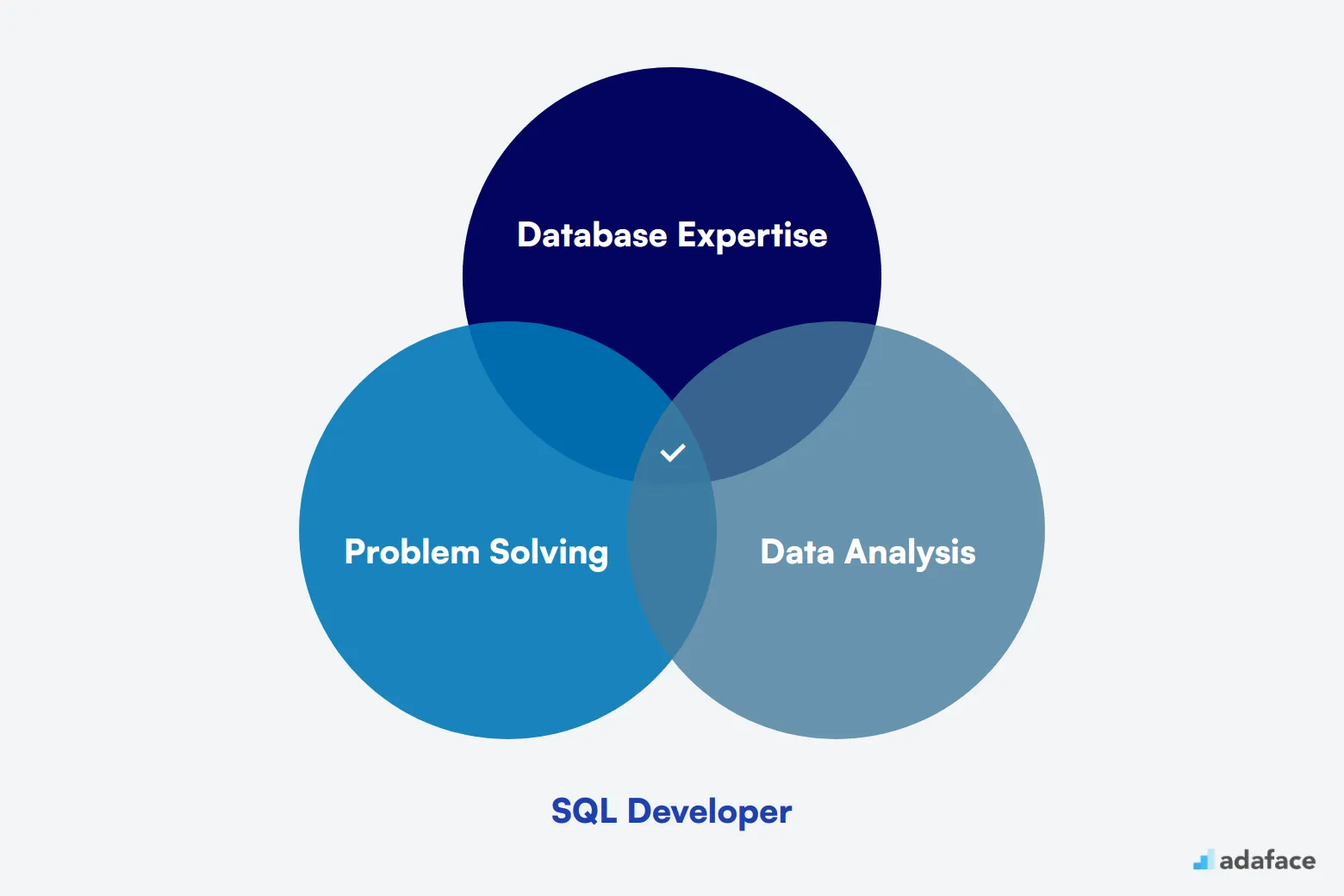
SQL Developer Hiring Process
Hiring the right SQL Developer is a key step in building a strong data management team. The process typically spans several weeks, depending on the organization's pace and resources.
- Craft a clear job description: Start with a well-defined SQL Developer job description and share it on relevant job boards.
- Screen resumes: Within the first 3-5 days, you'll start receiving resumes. Shortlist candidates based on their skills, experience, and alignment with your requirements.
- Conduct skill assessments: Use SQL-related skill assessments or coding tests to evaluate candidates' technical abilities. This phase can take around a week.
- Interview shortlisted candidates: Conduct technical interviews to assess deeper knowledge and fit for the team. This step usually takes another week.
- Make an offer: Once you've found the ideal candidate, extend an offer and discuss terms.
The entire process should take about 4-6 weeks from start to finish. It's important to maintain clear communication with candidates at each stage. We'll now explore these steps in more detail to help you manage this process effectively.
Skills and Qualifications to Look for in a SQL Developer
Before starting the hiring process, it's important to create a clear candidate profile for a SQL Developer. Many recruiters make the mistake of not differentiating between required and preferred skills, which can lead to confusion. Make sure to distinguish between the skills that are mandatory for the role and those that would be a bonus.
For the must-have skills, look for proficiency in SQL, experience with relational database management systems like MySQL or PostgreSQL, and strong problem-solving abilities. On the other hand, preferred skills might include experience with NoSQL databases or familiarity with big data technologies like Hadoop.
To aid in this process, consider using skill mapping tools. These can help you design assessments that test for specific technical skills relevant to the SQL Developer role. You can explore more about this on our skill mapping page.
| Required skills and qualifications | Preferred skills and qualifications |
|---|---|
| Proficiency in SQL (writing complex queries, stored procedures, and functions) | Experience with NoSQL databases (e.g., MongoDB, Cassandra) |
| Experience with relational database management systems (e.g., MySQL, PostgreSQL, Oracle) | Familiarity with big data technologies (e.g., Hadoop, Spark) |
| Understanding of database design principles and normalization | Knowledge of data warehousing concepts |
| Knowledge of data modeling and ETL processes | Experience with version control systems (e.g., Git) |
| Strong problem-solving and analytical skills | Understanding of agile development methodologies |
How to Write an Effective SQL Developer Job Description
Once you've outlined the ideal candidate profile for your SQL Developer role, it's time to craft a compelling job description. A well-written JD is key to attracting top talent. Here are some quick tips to help you create an impactful SQL Developer job description:
- Highlight key responsibilities: Clearly outline the primary duties, such as designing and optimizing database structures, writing complex SQL queries, and collaborating with cross-functional teams.
- Balance technical and soft skills: While emphasizing SQL proficiency, don't forget to mention important soft skills like problem-solving and communication.
- Showcase your company's USP: Highlight unique aspects of your organization, such as cutting-edge projects or growth opportunities, to stand out from other employers.
- Be specific about required experience: Mention the years of experience, specific SQL technologies, and any industry-specific knowledge you're looking for in candidates.
Top Platforms to Hire SQL Developers
Now that you have a well-crafted job description, it's time to list your SQL Developer position on job boards to attract qualified candidates. The right platform can significantly impact the quality and quantity of applicants you receive. Let's explore some of the best options for finding SQL talent.
LinkedIn Jobs
LinkedIn is ideal for recruiting SQL Developers for full-time roles due to its extensive professional network and advanced search filters.

Indeed
Indeed is one of the largest job boards, making it suitable for advertising full-time SQL Developer positions to a wide audience.

Upwork
Upwork is perfect for hiring freelance SQL Developers for short-term projects or flexible work arrangements.

Beyond these popular sites, there are specialized platforms catering to specific hiring needs. For remote work, Remote OK and We Work Remotely are excellent choices. Startups might find success on AngelList, while Glassdoor can help showcase company culture. For flexible arrangements, FlexJobs is a great option. Remember to use skills assessment tools to evaluate candidates efficiently once you've gathered a pool of potential hires.
How to Screen SQL Developer Resumes?
Screening resumes for SQL Developer roles is an important step to narrow down the candidates who meet your job requirements. With numerous applicants, it helps to quickly identify those who match the skills and qualifications needed for the role, saving time in the later interview stages.
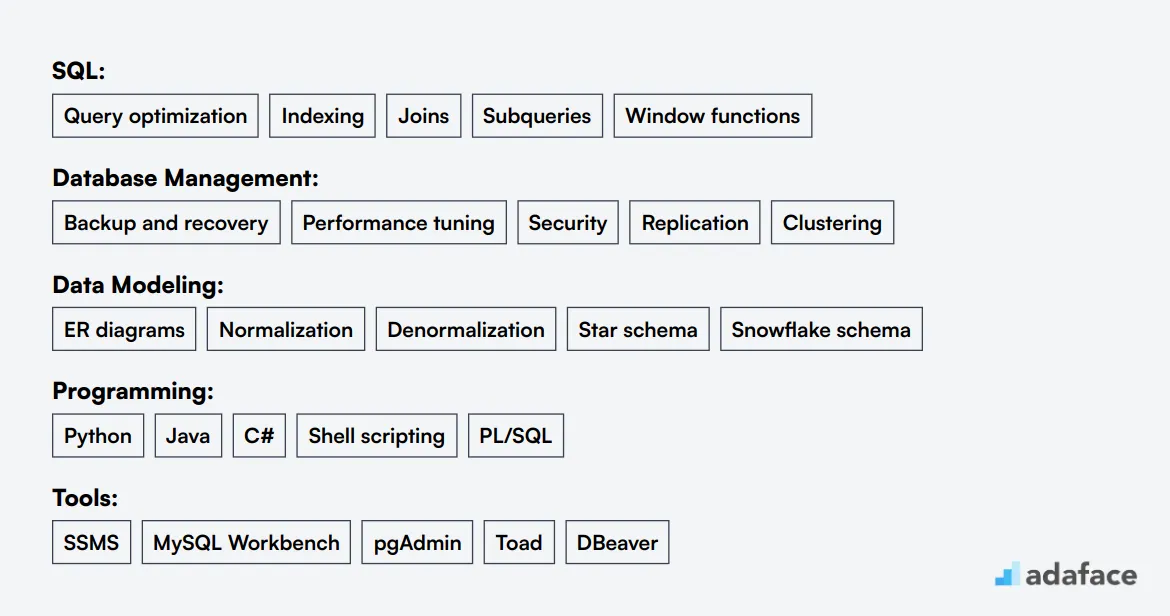
When manually screening resumes, knowing the right keywords is key. Look for mentions of proficiency in SQL, experience with relational database management systems like MySQL, PostgreSQL, or Oracle, and knowledge of database design principles. Shortlist resumes that align with these primary and secondary skills to proceed further.
Alternatively, you can use AI tools like LLMs for resume screening. Provide the AI with the keywords you are looking for, and let it analyze the resumes to highlight those that fit your criteria. This method can quickly streamline your search and ensure you don’t overlook potential candidates.
Here's an example of a prompt to use with AI for screening SQL Developer resumes:
TASK: Screen resumes to match job description for SQL Developer role
INPUT: Resumes
OUTPUT: For each resume, provide following information:
- Email id
- Name
- Matching keywords
- Score (out of 10 based on keywords matched)
- Recommendation (detailed recommendation of whether to shortlist this candidate or not)
- Shortlist (Yes, No or Maybe)
RULES:
- If you are unsure about a candidate's fit, put the candidate as Maybe instead of No
- Keep recommendation crisp and to the point.
KEYWORDS DATA:
- SQL (complex queries, stored procedures, functions)
- RDBMS (MySQL, PostgreSQL, Oracle)
- Database Design (normalization, data modeling)
Recommended skills tests for SQL Developer assessment
Skills tests are a great way to evaluate SQL Developers beyond their resumes. They provide objective insights into a candidate's technical abilities and problem-solving skills. Here are some key tests we recommend for assessing SQL Developers:
SQL skills test: This SQL online test evaluates a candidate's proficiency in writing complex queries, managing databases, and optimizing performance. It covers fundamental SQL concepts and practical application scenarios.
Database-specific tests: Depending on your tech stack, consider using tests for specific database systems. For example, an Oracle PL/SQL test or a MySQL assessment can provide deeper insights into a candidate's expertise with particular database environments.
T-SQL test: For organizations using Microsoft SQL Server, a T-SQL assessment is valuable. It evaluates skills in writing stored procedures, triggers, and complex queries specific to the SQL Server environment.
PostgreSQL test: If your company uses PostgreSQL, a dedicated PostgreSQL assessment can help evaluate candidates' familiarity with this open-source relational database system and its unique features.
Coding test: While SQL is the primary focus, many SQL Developer roles require some general programming skills. A coding test in a relevant language like Python or Java can assess a candidate's ability to write scripts and integrate SQL with application code.
Structuring the Interview Stage for SQL Developer Candidates
After candidates pass the initial skills test, it's time to evaluate their hard skills through technical interviews. These interviews are crucial for identifying the best-suited candidates for the SQL Developer role, as skills tests are better at filtering out unfit applicants than pinpointing top talent. The interview stage allows you to gauge a candidate's problem-solving abilities and depth of knowledge in SQL.
Here are some sample questions to consider during the interview: What is a subquery and how is it used in SQL? This question evaluates a candidate's ability to manipulate and interact with databases effectively. How would you optimize a slow SQL query? Understanding query optimization is vital for SQL developers to maintain performance. Can you explain the differences between INNER JOIN and OUTER JOIN? This tests their grasp of SQL join operations. Describe a time you implemented a database design. What challenges did you face? This question assesses both technical expertise and problem-solving skills. Lastly, What are the pros and cons of using indexes in SQL? Understanding indexing concepts is important for efficient data retrieval. Learn more on SQL Developer Interview Questions.
What is the cost of hiring a SQL Developer?
Hiring a SQL Developer can vary widely in cost depending on location and experience. In general, the salary range in the U.S. is between $66,052 and $132,165 annually, with a median salary of about $93,433.
In countries like Australia and Canada, SQL Developer salaries can range from AUD 82,965 to AUD 147,979 and CAD 61,538 to CAD 119,274 respectively. It's important to factor in specific regional salary trends to make informed hiring decisions.
SQL Developer Salary in the United States
The average salary for SQL Developers in the United States ranges from $66,052 to $132,165 per year. The median salary stands at $93,433, while the mean is approximately $96,918 annually.
Location plays a big role in determining SQL Developer salaries. For instance, Denver, CO offers the highest average at $152,376, while Houston, TX has the lowest at $92,404. New York, Chicago, and Dallas fall in the middle range, offering average salaries between $126,000 and $135,000.
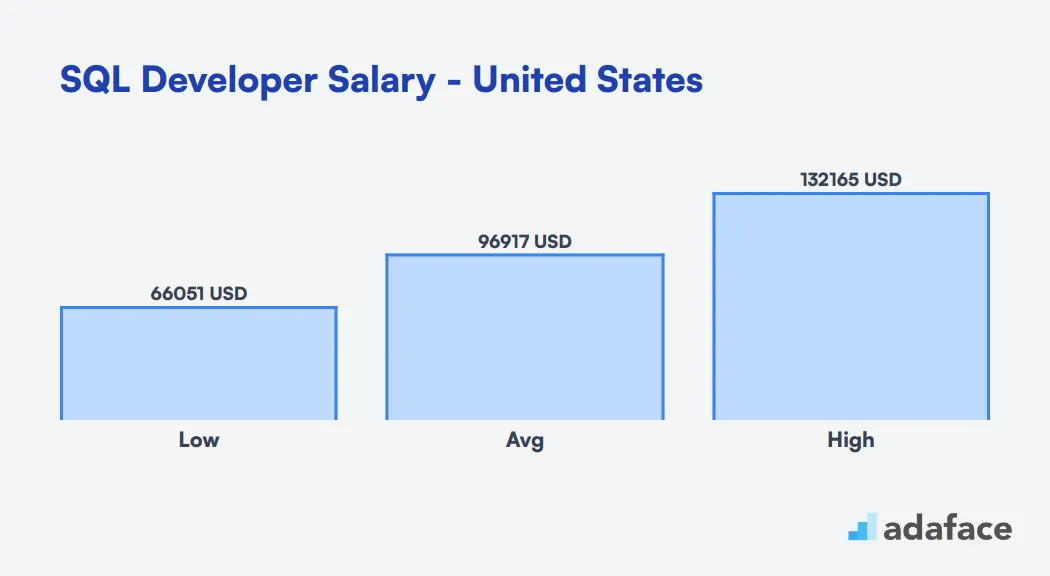
SQL Developer Salary in Australia
SQL Developer salaries in Australia vary by location and experience. The national average salary ranges from AUD 82,965 to AUD 147,979, with a median of AUD 110,802.
Canberra offers the highest salaries, with a median of AUD 203,957. Sydney and Brisbane follow with median salaries of AUD 120,553 and AUD 141,937 respectively. Melbourne has a lower median at AUD 87,499, but still offers competitive rates for skilled developers.
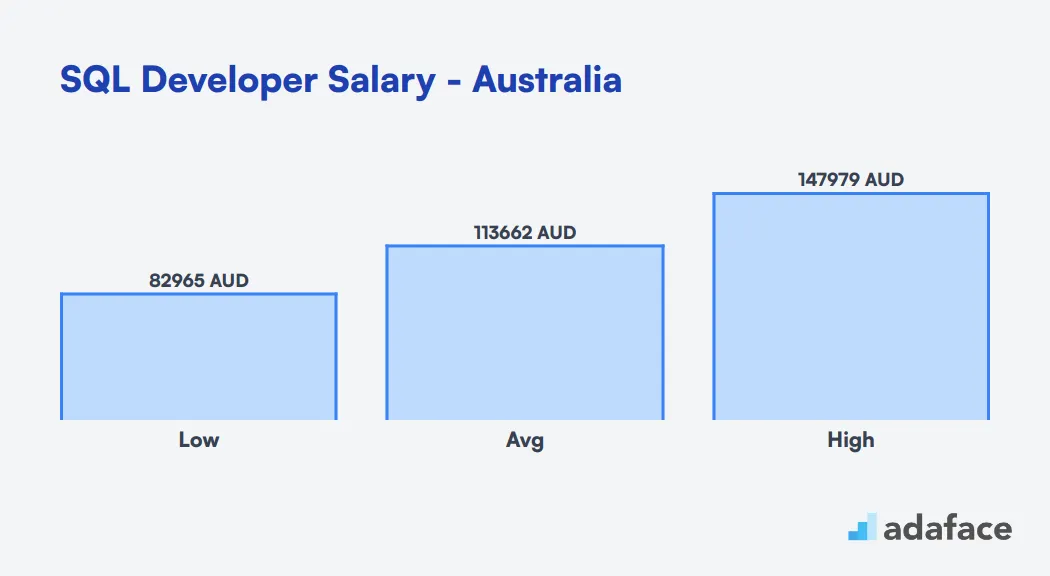
SQL Developer Salary in Canada
SQL Developer salaries in Canada vary based on location and experience. The national average salary ranges from CAD 61,538 to CAD 119,274, with a median of CAD 85,673.
Toronto offers the highest salaries, with a median of CAD 126,225. Other major cities like Montreal and Calgary have lower median salaries at CAD 84,913 and CAD 74,213 respectively. Factors such as company size, industry, and individual skills can influence these figures.
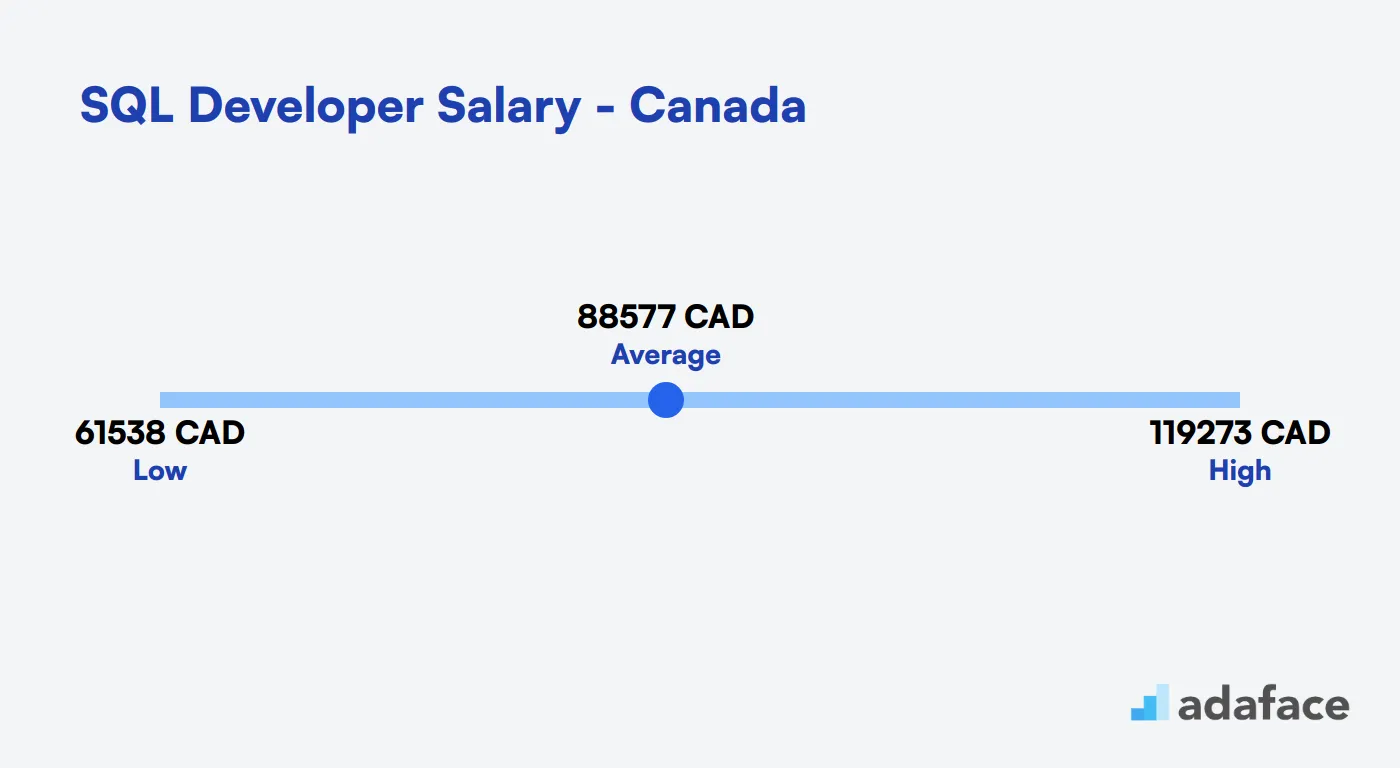
What's the difference between an SQL Developer and a Database Administrator?
SQL Developers and Database Administrators (DBAs) often get mixed up due to their overlapping involvement with databases. Both roles require a deep understanding of SQL and database systems, yet they serve different functions within an organization.
An SQL Developer focuses on writing and optimizing SQL queries, primarily handling the development of database applications. They work closely with software developers to create reports and data models, frequently interacting with development teams to solve data manipulation problems. Tools like SQL and PL/SQL are common in their toolkit.
On the other hand, a Database Administrator is responsible for the maintenance and security of a database, ensuring it operates smoothly. Their role is more aligned with operations, involving tasks such as backup, recovery, and troubleshooting. DBAs might use tools like Oracle, MySQL, and MSSQL to manage database performance effectively.
For more insights on the skills needed for these roles, you can explore our blog post on skills required for an SQL Developer.
| SQL Developer | Database Administrator | |
|---|---|---|
| Primary Focus | Writing SQL queries | Database maintenance |
| Main Responsibility | Developing database applications | Ensuring database security |
| Common Tools | SQL, PL/SQL | Oracle, MySQL, MSSQL |
| Role in Software Development Lifecycle | Development | Operations |
| Skills Required | Query optimization | Backup and recovery |
| Typical Work Output | Reports, Data Models | Database Performance |
| Interaction with Developers | High | Moderate |
| Problem Solving | Data manipulation | Troubleshooting |
Hire the Best SQL Developers for Your Team
In this guide, we've explored the importance of hiring SQL developers, the key skills and qualifications to look for, and how to effectively screen candidates through resumes and interviews. We've also provided insights into crafting an effective job description and highlighted platforms where you can find top talent.
If there's one key takeaway from this guide, it's the significance of using precise job descriptions and skill tests to ensure you hire the right SQL developer. Leveraging tools like SQL online tests can help in accurately assessing candidates and making informed hiring decisions.
SQL Online Test
FAQs
Key skills for SQL developers include proficiency in SQL query writing, database design, performance tuning, and understanding of relational database management systems. They should also have knowledge of data modeling, ETL processes, and familiarity with popular database platforms like MySQL, PostgreSQL, or Microsoft SQL Server.
To assess an SQL developer's technical skills, use a combination of coding tests, technical interviews, and practical problem-solving exercises. Consider using platforms like Adaface's SQL online test to evaluate candidates objectively and efficiently.
An effective SQL developer job description should include required technical skills, experience level, specific responsibilities, and any industry-specific knowledge. Highlight the projects they'll be working on and the impact of their role. For a detailed template, visit our SQL developer job description guide.
Look for SQL developers on professional networking sites like LinkedIn, tech-focused job boards, and developer communities like Stack Overflow. Attend database-related conferences and meetups, and consider partnering with tech bootcamps or universities that offer database management courses.
Structure the interview process in stages: initial screening, technical assessment, coding challenge, and in-depth interviews. Include both technical and behavioral questions. Consider pair programming sessions or whiteboard problem-solving to evaluate real-world skills. For specific questions, check our SQL developer interview questions guide.
Important non-technical skills for SQL developers include strong problem-solving abilities, excellent communication skills, attention to detail, and the ability to work in a team. They should also have good time management skills and be able to explain complex technical concepts to non-technical stakeholders.
To ensure a good fit, assess both technical skills and cultural alignment. Involve team members in the interview process, discuss the candidate's work style and preferences, and consider a trial project or probationary period. Clear communication about team dynamics, project expectations, and company values is key to finding the right match.

40 min skill tests.
No trick questions.
Accurate shortlisting.
We make it easy for you to find the best candidates in your pipeline with a 40 min skills test.
Try for freeRelated posts
Free resources



